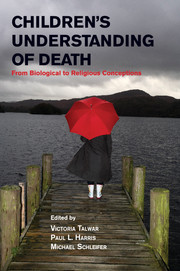Book contents
- Frontmatter
- Contents
- List of Figures and Table
- List of Contributors
- Preface and Acknowledgments
- 1 Death, Ancestors, and the Living Dead: Learning without Teaching in Madagascar
- 2 Death in Spain, Madagascar, and Beyond
- 3 Ambivalent Teaching and Painful Learning: Mastering the Facts of Life (?)
- 4 Death in the Lives of Children
- 5 Talking to Children about Death in Educational Settings
- 6 Responsible Believing
- 7 Thoughts and Feelings: Children and William James Have It Right!
- 8 How the Law Constructs Its Understanding of Death
- Index
- References
6 - Responsible Believing
Published online by Cambridge University Press: 03 May 2011
- Frontmatter
- Contents
- List of Figures and Table
- List of Contributors
- Preface and Acknowledgments
- 1 Death, Ancestors, and the Living Dead: Learning without Teaching in Madagascar
- 2 Death in Spain, Madagascar, and Beyond
- 3 Ambivalent Teaching and Painful Learning: Mastering the Facts of Life (?)
- 4 Death in the Lives of Children
- 5 Talking to Children about Death in Educational Settings
- 6 Responsible Believing
- 7 Thoughts and Feelings: Children and William James Have It Right!
- 8 How the Law Constructs Its Understanding of Death
- Index
- References
Summary
In most of our decisions as parents or educators concerning how we should talk to children about difficult subjects, the question turns to what degree we should withhold the truth, how much information we should provide, or what details are appropriate. We, as adults, know the answer to the child's question, and the difficulty arises in figuring out what to convey and how. Questions about death and the afterlife are not like this. We – and by “we,” I mean especially educated adults of the Western world – are often as confused about what we should believe about these matters as are our children. It seems that an initial step in our thinking about how to engage with children on this topic is to become clearer about how we ought to think about it. I will discuss this matter by engaging with the question of which norms ought to govern the formation and maintenance of our beliefs in general. We can then see how these norms would apply to beliefs about anything supernatural. What we ought to believe does not settle the question of how we should talk to children about our beliefs; we do not always want our children's beliefs to match our own. There may be particular reasons we want our children to believe things we do not (like Santa Claus brings them presents) or not believe things we do (like their noncustodial parent is a jerk); but I will concentrate on how one is a responsible believer in general, which will provide insight into how we can educate children to be responsible believers.
- Type
- Chapter
- Information
- Children's Understanding of DeathFrom Biological to Religious Conceptions, pp. 116 - 132Publisher: Cambridge University PressPrint publication year: 2011



